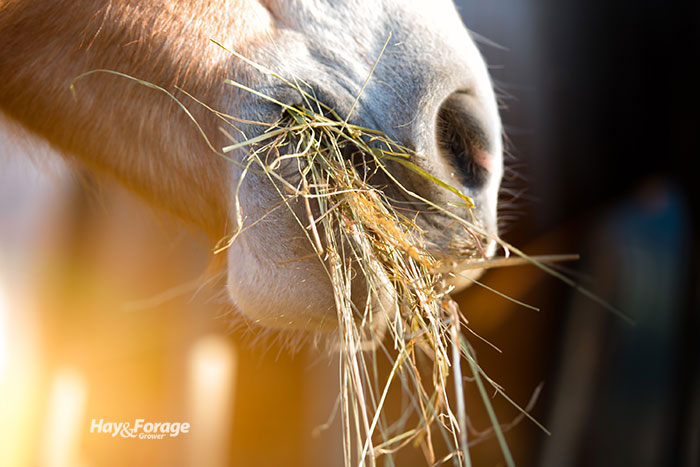Ask these 10 questions when buying horse hay |
| By C.J. Weddle |
|
|
 When purchasing horse hay, one must be mindful of a number of considerations before any money exchanges hands. Krishona Martinson, extension equine specialist at the University of Minnesota, provides 10 questions to ask when securing hay for your horses in her Horse Newsletter. 1. Have you sold to horse owners before, or do you specialize in hay for horses? How much hay do you have or bale each year? Horses are prone to health issues related to hay consumption. Weather events, how the hay is grown, and the way it is harvested and stored can all impact a horse’s health. Farmers that regularly produce hay for horses know what can cause health issues and try to prevent them. Asking how much hay a farmer grows can help you ensure that they can be a consistent supplier. 2. What kind of bales are available (small or large square bales and/or round bales)? What is the average weight of the bales? Not all hay farmers have each type of bale available for sale. Similarly, not all horse owners are properly equipped to feed all bale types. With your preference in mind, make sure to ask hay suppliers how much of each bale type is available. Knowing the average weight of bales will help you calculate the best bang for your buck. As Martinson explains, buying 50-pound bales at $6 each ($240 per ton) is a better buy than 35-pound bales at $5 each ($286 per ton). 3. What species are present in the hay? Legume and grass species have very different nutrient values, which are both important in a balanced diet. “Legumes, like alfalfa, tend to be higher in crude protein, energy, and calcium, and lower in nonstructural carbohydrates and fiber values compared to cool-season grasses,” says Martinson. 4. How mature is the hay? Maturity is the main driver in forage quality. More mature forages have larger stems and flowers (legume species) and seedheads (grass species), which are by no means “bad forages.” However, they are better suited for idle horses, while less mature forages tend to be better for horses with higher activity levels and caloric requirements. 5. Where was the hay harvested? This question helps you confirm that the hay was not harvested from road ditches, which can contain roadkill carcasses, garbage, and weeds. 6. Was the hay rained on? Martinson states that rained on hay can actually be a good choice for horses with metabolic problems, as it tends to be lower in nonstructural carbohydrates. Although, hay that receives excessive rainfall is usually not a good option for horses in general. 7. Was the hay stored inside or under cover after baling? Proper storage helps to preserve the quality of the hay and prevent a loss in volume. Hay that is uncovered is more susceptible to mold and bale deterioration. 8. Was the hayfield fertilized and/or sprayed for weeds? “Fields that have been fertilized show good management and likely produce a better quality hay,” notes Martinson. Weed control is very important, too, considering that hay for horses should have less than 10% nontoxic weeds; there is zero tolerance for poisonous plants in horse hay. Being able to identify desirable forage species can help hay growers and horse owners identify weeds in the hay. 9. What is the price? Knowing the price of the hay you intend to buy is important for many reasons. As stated earlier, comparing prices can save you a significant amount of money when buying in bulk. Inquiries about bulk and cash discounts are other ways to save a few dollars. Additional payment options may include monthly installments or other plans to be discussed between you and the hay supplier. 10. Is delivery available? If so, at what cost? Find out if onsite assistance will be available for unloading and stacking. These questions are often overlooked but are very important and can help you manage hay transportation. While some of these questions may not be first on your list to ask hay suppliers, none of these issues should be overlooked. Most importantly, find a hay supplier who you can develop a good working relationship with from year-to-year.  C.J. Weddle C.J. Weddle is serving as the 2020 Hay & Forage Grower editorial intern. She currently attends Mississippi State University, majoring in agricultural education, leadership, and communications. She grew up on a farm in Vardaman, Miss., where her family raises sweet potatoes and soybeans.
|
